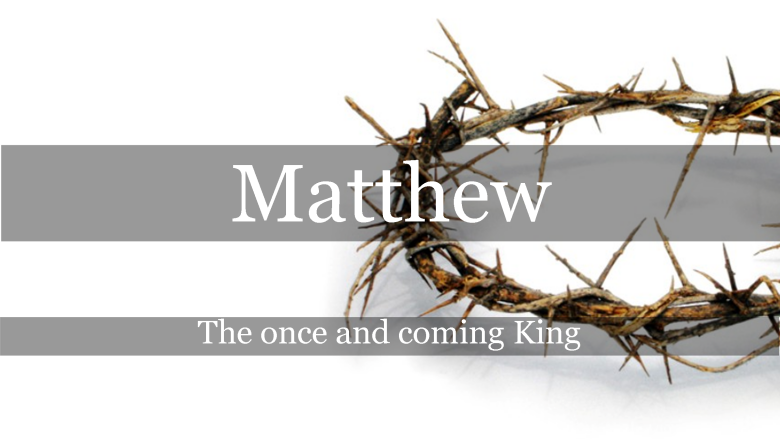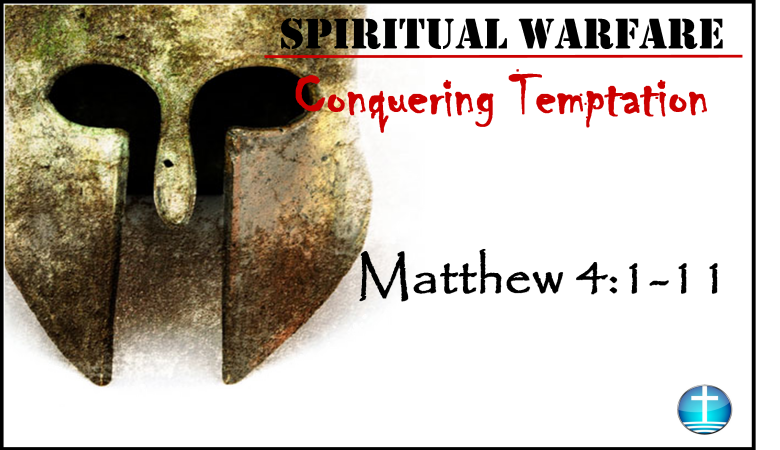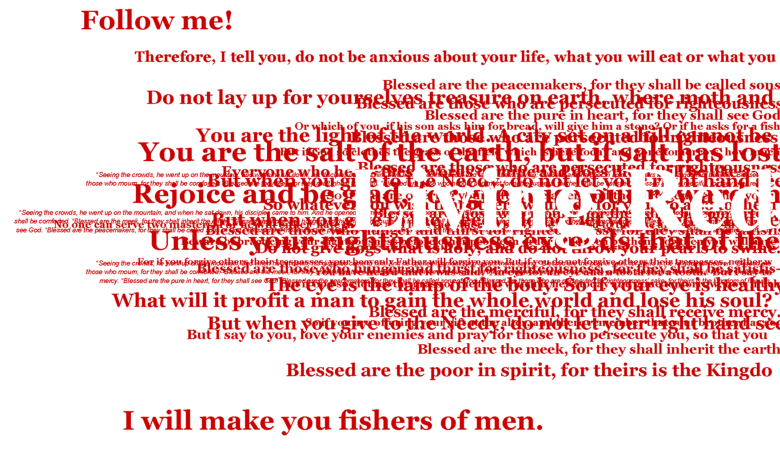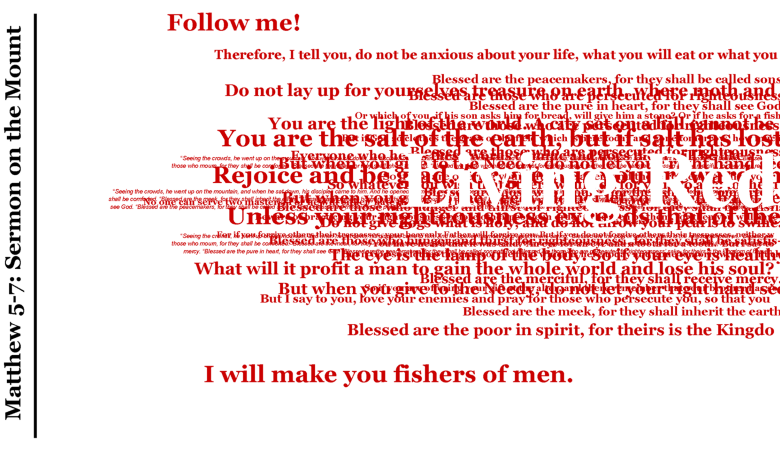Matthew 5:6 Starving For Righteousness
Matthew 5:6
Righteous Hungering
By Joshua Claycamp
“Blessed are those who hunger and thirst for righteousness, for they shall be satisfied.” (Matthew 5:6, ESV)
The Moral Problem
At a coffee bar, there’s a Baptist, a Jew, and a Muslim. You’d think I was telling you a joke, but I am not. This really happened. About 3 ½ years ago at Thompson Rivers University, we do a coffee ministry at the Residence at McGill Dorms. We ended up in a round-table discussion with a Muslim, Jew, and an atheist. And the question came up: “What in your life is absolute?”
Different people threw out different ideas. One thing that was really interesting was that in this diverse group of people, the only one at the table that was really being a stick in the mud was me. Between all of those differing religious beliefs they all agreed that you can’t really force your morality on anyone else. The idea was that everyone needs to figure that out for themselves. Now, I like to play devil’s advocate. So I asked the question, “When you come to take your math exam, is there a right answer? Or is all just relative? Is what you believe just as good as what the teacher suggests? Have you ever attempted to take a math exam with the philosophy that you’ve just espoused?”
Is it actually possible that things can be just whatever you want them to be, or is it actually true that there is a certain truth in this world that is undeniable? All of the students responded that while the sciences were true, morality was in a class unto itself. Morality, according to these university students, was not absolute.
So I responded with a different question: was Hitler wrong to exterminate the Jews? And of course the response was, “Yes. Hitler was wrong.” To this I responded, “Why?” And the student’s response was that we should, “love people.” All of these are students of evolutionary theory. Now, if it is true that morality is an evolved trait that doesn’t work well within a Darwinian system of survival of the fittest, then wouldn’t Hitler be our hero?
At the conclusion of this discussion all of the students acknowledged that morality is universal, but we shouldn’t pursue that morality to the end of its logical conclusion. We should just stop short at a basic morality that fits our own tastes and interest.
The Emotional Problem
This past summer I read a book by an author named Annie Dillard. Dillard determined to get in touch with her pre-evolved self, so she left her home behind and went to live on the side of a creek in Virginia. She came back and said that,
“But wait, ‘right and wrong is a human concept.’ Precisely! We are moral creatures living in an amoral world. Or consider the alternative: it is only human feeling that is freakishly amiss. All right then – it is our emotions that are amiss. We are freaks, the world is fine, and let us all go have lobotomies to restore us to a natural state. We can leave, lobotomized, go back to the creek, and live on its banks as untroubled as any muskrat or reed. You first.”
From her perspective the thing that is wrong with us our moral code. From her perspective, lobotomy solves all the issues. But when you lose the emotions of guilt, remorse, and sorrow you also lose all of the emotions of happiness, joy, and pleasure.
No atheist really wants to take that next step. No one wants to have a lobotomy.
Sad are those who reject Morality
Even though we are hanging onto our emotions, it is our emotions that are driving us to despair. All of this meaninglessness leads to a desperate contradiction within our souls, and drives us to despair. In countries where atheism has been exalted by rule of law at the tip of gun, countries like the former United Soviet Socialist Republic, or modern day Russia and Lithuania, you’ll notice that these countries have the highest suicide rate in the world.
At the end of it all, if there is no right and wrong and no morality then there really is no purpose to life. Which means that we can conclude: Sad are those who reject all righteousness. Sad are those who deny all reality. That seems to be the outward condition of all our efforts to push God, faith, and right and wrong out of our life. On our own with all our clever theories about evolution and survival of the fittest we just plain sad.
Happy are those who hunger and thirst for Righteousness
So what does this mean to hunger and thirst for righteousness? It’s in the present active participle which means that it is referring to people who go on hungering and thirsting for righteousness. It is a continual sort of hungering and thirsting.
Have you ever been really hungry or thirsty? Some of you may say yes. But I don’t think you know what I’m really getting at. For us hunger is typically understood as having to wait an extra hour or so until lunch. For us hunger consists of eating a breath mint to hold me over until dinner time. That’s our typical Canadian understanding of hunger.
We are not really familiar with the type of hunger and thirsting that Jesus is talking about here in Matthew 5. Jesus is talking about an intense hungering and thirst. The reality of this hunger and thirst is that you’re driven by it.
There’s an account written by British and Allied soldiers who were taking back Palestine during World War I. As the allied troops moved northward past Beersheba they began to outdistance their water-carrying camel train.
When our water ran out, our mouths got dry, our heads ached, the sun beat down mercilessly, our joints became sore, and we became dizzy and faint. Eyes became bloodshot, lips swelled and turned purple, our tongues became thick in our mouth, and mirages became common. Eventually we became delirious.
They knew that if they did not make the wells of Sheriah by nightfall, thousands of them would die-as hundreds already had done. Literally fighting for their lives, they managed to drive the Turks from Sheriah.
As water was distributed from the great stone cisterns, the more able-bodied were required to stand at attention and wait for the wounded and those who would take guard duty to drink first. It was four hours before the last man had his drink. During that time the men stood no more than twenty feet from thousands of gallons of water, to drink of which had been their consuming passion for many agonizing days. It is said that one of the officers who was present reported,
“I believe that we all learned our first real Bible lesson on the march from Beersheba to Sheriah Wells. If such were our thirst for God, for righteousness and for His will in our lives, a consuming, all-embracing, preoccupying desire, how rich in the fruit of the Spirit would we be?” (E.M. Blaiklock, “Water,” Eternity (August 1966), p. 27).
Do you hunger and thirst for righteousness? Consider your life for a second. The kind of hunger we’re talking about here is not the kind where you eat a breath mint that holds you over until lunch time. The kind of hunger that we’re talking about is the consuming, driving, passionate “I MUST HAVE RIGHTEOUSNESS!” That’s the kind of thirsting that we’re talking about. That’s the desire that we’re looking for. That’s what Jesus is calling for in his disciples.
Jesus says, “Blessed are those who are passionate, who have a desperate, longing desire for righteousness.” How do you have that passionate desire? Where does that desire come from? Any o fyou , if you look at your life, you know that maybe your a good person, but you know that you’ve done wrong. Have you ever had one of those events that you’ve done something wrong and it occupied your thoughts for awhile, and you just can’t stop thinking about it. It’s one of those events that may fade from your memory over time, but it will still pop up from time to time, even at the most unlikely of moments. All of a sudden the thought just comes back to you with a flood and it totally captivates you. And you are left asking yourself, “Why did I ever do that?”
If you’ve never had that experience, then you should be concerned right now. There’s probably not a strong enough desire in your soul for righteousness. There’s probably not a deep enough thirst in your heart for righteousness as there ought to be.
We have eight beatitudes with an expansion in verses 11 and 12 of the last beatitude. In verse 2 it says, “Blessed are the poor in spirit for they shall inherit the Kingdom of heaven.” So the first promised reward is the Kingdom of Heaven. Look at verse 10. It says, “Blessed are those who are persecuted for righteousness’ sake for theirs is the Kingdom of Heaven.” So you’ve got Kingdom of Heaven at the beginning and at the end so that it forms book ends. These book ends encapsulate everything in between them which is the remaining beatitudes.
Now, there’s another interesting phrase here. If you look at Verse 6 you will encounter beatitude number four. Beatitude number says, “Blessed are those who hunger and thirst for righteousness...” The last work here is righteousness. Now go to the very last beatitude in verse 10. “Blessed are those who are persecuted for righteousness’ sake.” So the first beatitude talks about receiving the Kingdom of Heaven. The last beatitude talks about receiving the Kingdom. The middle beatitude talks about righteousness and the last beatitude talks about righteousness.
Jesus is saying something. There is a logical progression to the way that these beatitudes are presented. We’ll draw all of that when we get to the last one. But the first four beatitudes are all outward looking, that is looking away from you. Blessed are those who realize that they are beggars before God. Blessed are those who mourn the true source of all sorrow, the fact that God is no longer present with us in our lives. Blessed are those who are meek, who have a quality of wisdom, and they understand what it is that God is trying to say to them.
But here we arrive at this longing: blessed are those who hunger and thirst for righteousness. The first three have all been outward looking, that we cannot do anything before God. We are beggars before God. We can’t do anything but mourn the fact that He’s not in our lives anymore. We can’t do anything except meekly and humbly receive the truth of just how wretched we are without God in our lives. Then, it should follow logically, that we would hunger and thirst for righteousness. If we are beggars, and if we are sad, and if we are wise then we should be thirsty for righteousness.
How can we get that righteousness? How can we get a drink of that righteousness?
Receiving the Righteousness of God
Turn to Romans 3:21-26.
“But now the righteousness of God has been manifested apart from the law, although the Law and the Prophets bear witness to it— the righteousness of God through faith in Jesus Christ for all who believe. For there is no distinction: for all have sinned and fall short of the glory of God, and are justified by his grace as a gift, through the redemption that is in Christ Jesus, whom God put forward as a propitiation by his blood, to be received by faith. This was to show God’s righteousness, because in his divine forbearance he had passed over former sins. It was to show his righteousness at the present time, so that he might be just and the justifier of the one who has faith in Jesus.” (Romans 3:21–26, ESV)
The first thing this passage talks about is the righteousness of God. What do we know about God? We know that He is perfect. In every attribute that He has He is perfect in the possession of that attribute both in degree and quality. For example, God is not just kind-of holy. He is infinitely holy. He’s not just sort-of loving. He infinitely loves. He’s not just kind-of righteous, He’s not just kind-of a good guy, He is infinitely righteous.
So what Paul is talking about here in Romans 3:21 is an infinitely holy type of Righteousness. This righteousness is revealed apart from the law. Then Paul repeats it again in order to draw your attention to it.
Paul talks about the righteousness of God, “...through faith in Jesus Christ for all who believe.” The righteousness of God, the infinite holy righteousness of God, is through faith in Jesus Christ for all who believe. Paul is engaged in a polemic between Jews and Gentiles. Jews attempt to earn their righteousness before God. They operate under the assumption that if they keep the law and do good works that they can satisfy God. But they cannot. Paul is arguing that there is no righteousness apart from faith in Jesus Christ. Paul is arguing for a righteousness that is not contingent upon what you do, but is based upon faith in Jesus Christ.
This is completely consistent with what Jesus is teaching in Matthew 5. If we are all beggars then there is nothing that we can do to earn the righteousness necessary to be in a correct standing with God. There’s nothing you can bring to God that He didn’t first give to you anyway. But even with regards to righteousness, there’s nothing you have that you can hold before God and say, “See, here is my righteousness!” It’s all from God.
This is exactly what Jesus is saying in the beatitudes and what Paul is saying in Romans that the righteousness that you need to be accepted in God’s eyes is entirely from God. He goes on to say that “All of us have sinned, and fallen short of the glory of God.” All of us! Paul then says that “We are justified by His grace,” as a gift. Paul then emphasizes it again that the righteousness of God is to be received by faith.
So how do I take a sip of this infinite righteousness? The answer: trust in Jesus Christ. The text is clear: “To be received by faith.” The text goes on to say that this is to show the righteousness of God at the present time in order that God might be both ‘just’ and the ‘justifier’ of the one who believes.
Putting it all together:
When you turn to God and acknowledge that you are a beggar and that you have nothing in this world apart from Him and that there is nothing that you can bring to the table, when you mourn the loss of His presence in your life realizing that this world is totally broken because of our sin –yours and mine, when you embrace meekness and wisdom and agree with God that all of these things are true, it is at this point in time that you begin to exhibit faith. You begin to trust in God.
To receive the righteousness of God is not to deny the truth. You must never say to yourself, “You know what? I’m a pretty good guy.” You must agree with God. You must trust in God. And to trust in God means that you believe in His Word over your own opinion. And His Word says that you can’t do anything to earn any standing with Him.
So when you agree with that then you begin to trust in Him. And when you begin to trust Him then you begin to receive what He gives to you. And He promises to you now that He gives you His righteousness. Now what other righteousness do you need if you’ve received God’s infinite righteousness? The simple answer is this: you don’t need any additional righteousness.
Turn to 2 Corinthians 5:21.
“For our sake he made him to be sin who knew no sin, so that in him we might become the righteousness of God.” (2 Corinthians 5:21, ESV)
There’s a union that takes place between the believer and Jesus Christ. The scripture says that you “become the righteousness of God,” when you place your faith in Jesus. God gives it to you. So that when God looks at Josh Claycamp He doesn’t see all the bad things that I’ve done. And a lot of people agree with this and say, “Yes. God wipes our slate clean in Jesus Christ.” But it’s more than this. You’ve missed the point. God doesn’t just wipe your slate clean. When God looks at you he doesn’t just see a neutral you, a version of you with your slate wiped clean. It isn’t that you were in the hole, that you were at negative, and now God has cleared your debt and brought you up to zero. You were negative, and now you are infinitely righteousness. In other words, when God looks at you He HAS TO SAVE YOU, HE HAS TO BLESS YOU, YOU HAVE TO GO TO HEAVEN! You cannot add to your salvation. You cannot take away from your salvation.
We are not living a Tax-Payer Christianity
In taxpayer Christianity you pay taxes to God, and because you are a tax payer you are entitled to certain rights. And a lot of people live the Christian life this way. Because I go to church, because I tithe, because I attend bible study, because I do all of these things God has to bless me, God will have to save me some day. That is taxpayer Christianity. That is not even remotely the case here. You’re beggars. You couldn’t pay taxes even if you wanted to.
So if taxpayer Christianity is false, then basically all anyone has to do is trust in Jesus and you’re saved, right? So, I trust in Jesus. I pray this prayer. I get baptized, maybe. Maybe I don’t. It depends on if I feel like it. But once I go through this process then I’m saved. So, I’ll see ya later. You will never see me again, because I’m saved and I no longer need anything that this church has to offer me. I’m done. End of story. End of discussion.
No, this is incorrect. Jesus’ words in Matthew 5 are not “Blessed are those who want to make a one-time exchange, and have one quick sip of righteousness.” As I said at the beginning, this verb is a present active tense participle. The correct translation should read, “Blessed are those who are hungering and thirsting and longing for the righteousness of God.” If you think for one second that if you can just walk down here and say a prayer, and seal the deal, and then walk away and never have a hunger or longing in your life for God, then that prayer was never valid. That prayer that you prayed in which you said that you were just going to make a one-time deal and then I’ll see you again when I die, that is not the righteousness that Jesus is talking about. Furthermore, since it is not the hungering and thirsting that Jesus is talking about then you are also not entitled to the blessedness that is offered here.
There’s a difference between taxpayer Christianity verses a love relationship. For a person who says that this Christianity thing is so easy, you just go down and pray a prayer and you’re saved, for a person who says this they’ve never really understood what it means to have a real relationship with God. Christianity is not a business exchange. It is a personal love relationship with Jesus as your King.
It’s kind of like when I was dating Shanti. At some point in time I convinced her that I was the man of her dreams and then I proposed to her. She said yes. Now, it would be wrong if –after hearing Shanti say yes to my marriage proposal – I turn around and exclaim, “Great! Now, I can do whatever I want!” Now some people do look at marriage this way. But those people have never understood what it means to have a real relationship with God. When you love a person you want to do what makes them happy. You want to bless them. You care about them. True Christianity too often is portrayed like a tax-payer system. And the truth is we’re saved when we love Jesus, when we hunger and thirst for Him.
Grace has an Edge to It
There is a lady who attends Redeemer Presbyterian Church in New York who made the following comment:
“If I was saved by my good works then there would be a limit to what God could ask of me or put me through. I would be like a taxpayer, with ‘rights’ – I would have done my duty and now I would deserve a certain quality of life. But if I am a sinner saved by grace – then there’s nothing he can’t ask of me.” (Cited in Timothy Keller, The Reason for God, pg. 189.)
That’s the dynamic of grace. There’s nothing that my wife can’t ask of me. Our relationship is not like quid pro quo. There is nothing we don’t discuss together, there is nothing that we can’t ask of each other, and there is nothing that we don’t want to do for each other.
That’s what Jesus is talking about in Matthew 5. To hunger and thirst for righteousness doesn’t mean simply that you want to be righteous, but it also means that you value the things that God values, you desire the things God desires, and you want what He wants.
God values you. But God also values the people around you. And the people all around this city. And the people all around the world. Which means if you value God then you will also value the things that God values. And if you value the things God values then you also will value people all around the world. If you are hungering and thirsting for righteousness’, you want that righteousness’ in your life, but you also want to see that righteousness in the lives of everyone.
Grace is pretty stiff in this regard. Your King’s love drives Him to reach out to the whole world, which means that if you love your King you will also be driven to reach out to the whole world.
“For we are his workmanship, created in Christ Jesus for good works, which God prepared beforehand, that we should walk in them.” (Ephesians 2:10, ESV)
If you’ve ever gotten a taste of righteousness’ in your life, you want that for other people. Church, do you want righteousness’ for other people? Are you hungering and thirsting for righteousness in your own life? Where are you at in your starvation?
Series Information

The Gospel of Matthew is a story about a once and coming King. Jesus of Nazareth is the Son of David, the long awaited for Messiah. He has come once, and Matthew tells the story of His arrival, ministry, sacrificial atoning work on the cross, and His promise to return soon.






